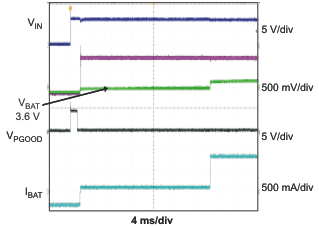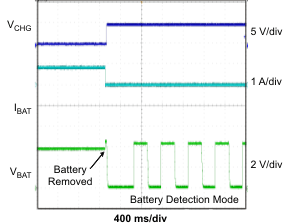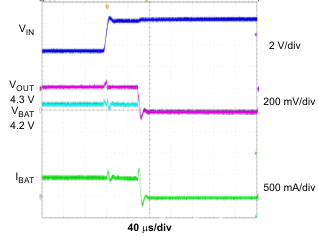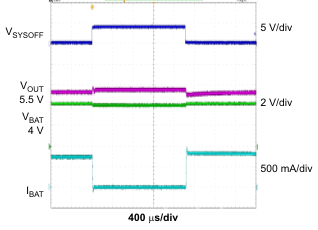SLUS937C December 2009 – December 2019 BQ24072T , BQ24075T , BQ24079T
PRODUCTION DATA.
- 1 Features
- 2 Applications
- 3 Description
- 4 Revision History
- 5 Description (continued)
- 6 Device Options
- 7 Pin Configuration and Functions
- 8 Specifications
-
9 Detailed Description
- 9.1 Overview
- 9.2 Functional Block Diagram
- 9.3
Feature Description
- 9.3.1 Undervoltage Lockout (UVLO)
- 9.3.2 Overvoltage Protection (OVP)
- 9.3.3 Dynamic Power-Path Management
- 9.3.4 Battery Charging
- 9.3.5 Charge Current Translator
- 9.3.6 Battery Detection and Recharge
- 9.3.7 Termination Disable (TD Input, BQ24072T)
- 9.3.8 Battery Disconnect (SYSOFF Input)
- 9.3.9 Dynamic Charge Timers (TMR Input)
- 9.3.10 Status Indicators (PGOOD, CHG)
- 9.3.11 Thermal Regulation and Thermal Shutdown
- 9.3.12 Battery Pack Temperature Monitoring
- 9.4 Device Functional Modes
-
10Applications and Implementation
- 10.1 Application Information
- 10.2
Typical Applications
- 10.2.1
Using the BQ24075T, BQ24079T to Disconnect the Battery from the System
- 10.2.1.1 Design Requirements
- 10.2.1.2
Detailed Design Procedure
- 10.2.1.2.1 Program the Fast Charge Current (ISET):
- 10.2.1.2.2 Program the Input Current Limit (ILIM):
- 10.2.1.2.3 Program 6.25-hour Fast-Charge Safety Timer (TMR):
- 10.2.1.2.4 TS Function:
- 10.2.1.2.5 CHG and PGOOD LED Status:
- 10.2.1.2.6 Processor Monitoring Status:
- 10.2.1.2.7 System ON/OFF (SYSOFF):
- 10.2.1.2.8 Selecting IN, OUT and BAT Capacitors
- 10.2.1.3 Application Curves
- 10.2.2 BQ24072T in a Host Controlled Charger Application
- 10.2.1
Using the BQ24075T, BQ24079T to Disconnect the Battery from the System
- 11Power Supply Recommendations
- 12Layout
- 13Device and Documentation Support
- 14Mechanical, Packaging, and Orderable Information
10.2.1.3 Application Curves

| RLOAD = 10 Ω | ||



| ILOAD = 25 mA TO 250 mA | ||

| VIN = 5.5 V to 8.5 V | ||

| VIN = 0 V | ||


| VIN = 6 V | ||
